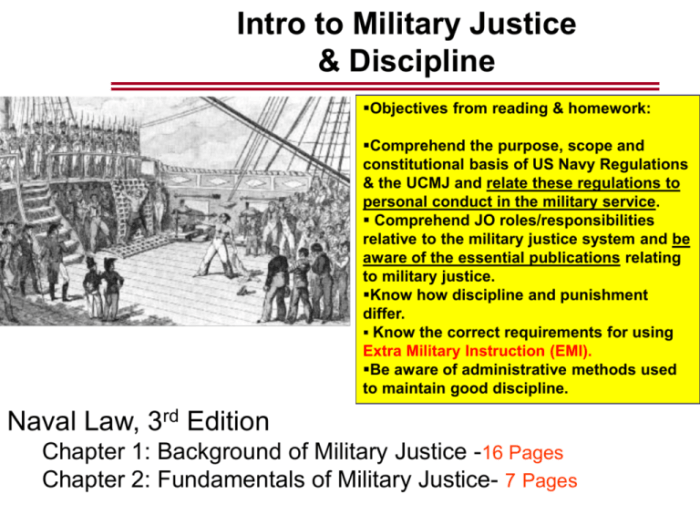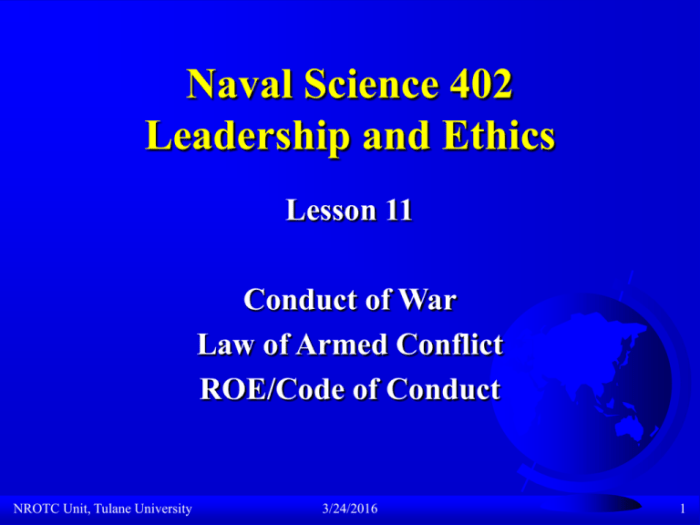In accordance with naval leadership teaching, this article delves into the historical significance and evolution of naval leadership principles, exploring their impact on maritime operations throughout history. We will examine the core principles of naval leadership, including integrity, accountability, and ethical decision-making, and how these principles have been effectively implemented by naval leaders in practice.
Furthermore, we will discuss the challenges and opportunities faced by naval leaders in adhering to these teachings in modern warfare, and explore the methods used to train and develop naval leaders in accordance with these principles. Finally, we will compare the naval leadership teachings of different countries or organizations, identifying similarities and differences in their approaches to leadership development.
Historical Context: In Accordance With Naval Leadership Teaching

Naval leadership teachings have played a pivotal role in shaping maritime operations throughout history. From ancient seafaring civilizations to modern navies, the principles of effective leadership have been essential for ensuring the success and safety of maritime endeavors.
The evolution of naval leadership principles has been closely tied to the changing nature of warfare and the advancements in technology. In the early days of naval warfare, leadership was primarily focused on maintaining discipline and order among the crew.
However, as navies became more complex and operations more sophisticated, the need for a more comprehensive and nuanced approach to leadership became apparent.
Key Principles of Naval Leadership
The core principles of naval leadership, as defined in official teachings, encompass a wide range of attributes and competencies. Among the most important are:
- Integrity:Naval leaders must adhere to the highest ethical standards, demonstrating honesty, trustworthiness, and a commitment to doing the right thing.
- Accountability:Leaders are responsible for their actions and decisions, and must be willing to take ownership of both successes and failures.
- Ethical decision-making:Naval leaders must make decisions that are both ethically sound and operationally effective, considering the potential consequences for their crew, the mission, and the broader community.
Leadership in Practice, In accordance with naval leadership teaching
Numerous examples exist of naval leaders who have effectively implemented these teachings and achieved remarkable results. One notable example is Admiral Horatio Nelson, who led the British Navy to victory at the Battle of Trafalgar in 1805. Nelson was known for his exceptional leadership skills, including his ability to inspire his crew, make quick decisions under pressure, and maintain a clear vision for the mission.
Challenges and Opportunities
Naval leaders face a range of challenges in adhering to these teachings in modern warfare. These include the increasing complexity of operations, the need to operate in diverse and challenging environments, and the evolving nature of threats. However, these challenges also present opportunities for innovation and adaptation in naval leadership practices.
Training and Development
The training and development of naval leaders is crucial for ensuring that they are equipped with the knowledge, skills, and attitudes necessary to lead effectively. Methods used to train and develop naval leaders include formal education, on-the-job training, and mentorship programs.
The curriculum for naval leadership training typically includes courses on leadership theory, ethics, decision-making, and operational planning. Exercises and simulations are also used to provide practical experience in applying leadership principles in realistic scenarios.
Comparative Analysis
A comparative analysis of the naval leadership teachings of different countries or organizations reveals both similarities and differences in their approaches to leadership development. For example, the United States Navy emphasizes the importance of decentralized decision-making and individual initiative, while the Royal Navy places a greater emphasis on centralized command and control.
Impact on Maritime Operations
The implementation of naval leadership teachings has a profound impact on the effectiveness of maritime operations. Effective leadership fosters teamwork, communication, and decision-making at sea, which are essential for achieving mission success.
Leaders who adhere to these teachings create a positive and supportive environment for their crews, which leads to increased morale and motivation. They also make sound decisions under pressure, which can mean the difference between success and failure in a critical situation.
Future Directions
Naval leadership is constantly evolving to meet the challenges of the future. Emerging trends include the increasing use of technology in naval operations, the need for leaders to be adaptable and innovative, and the importance of diversity and inclusion in the leadership ranks.
To adapt to these trends, naval leadership teachings must continue to evolve and incorporate new knowledge and perspectives. This will ensure that naval leaders are prepared to meet the challenges of the future and lead their crews to success.
FAQ Guide
What are the key principles of naval leadership?
The key principles of naval leadership include integrity, accountability, ethical decision-making, and a commitment to teamwork and mission accomplishment.
How are naval leaders trained and developed?
Naval leaders are trained and developed through a variety of methods, including formal education, on-the-job training, and mentorship programs.
What are the challenges faced by naval leaders in adhering to these teachings in modern warfare?
Naval leaders face a number of challenges in adhering to these teachings in modern warfare, including the increasing complexity of naval operations, the need to operate in a joint and multinational environment, and the ethical dilemmas posed by new technologies.

